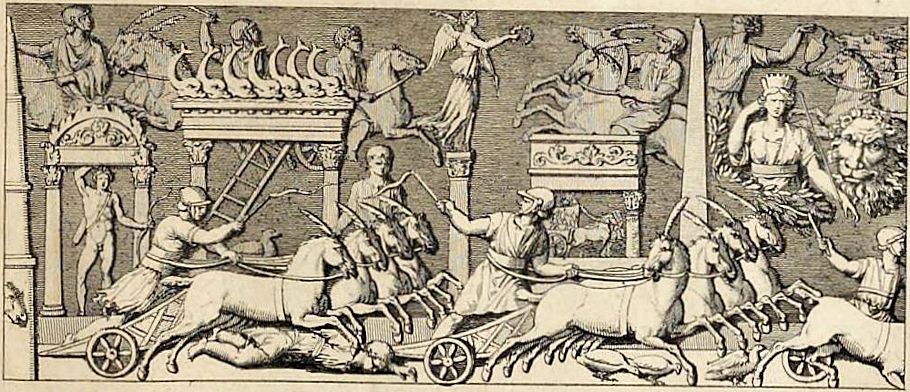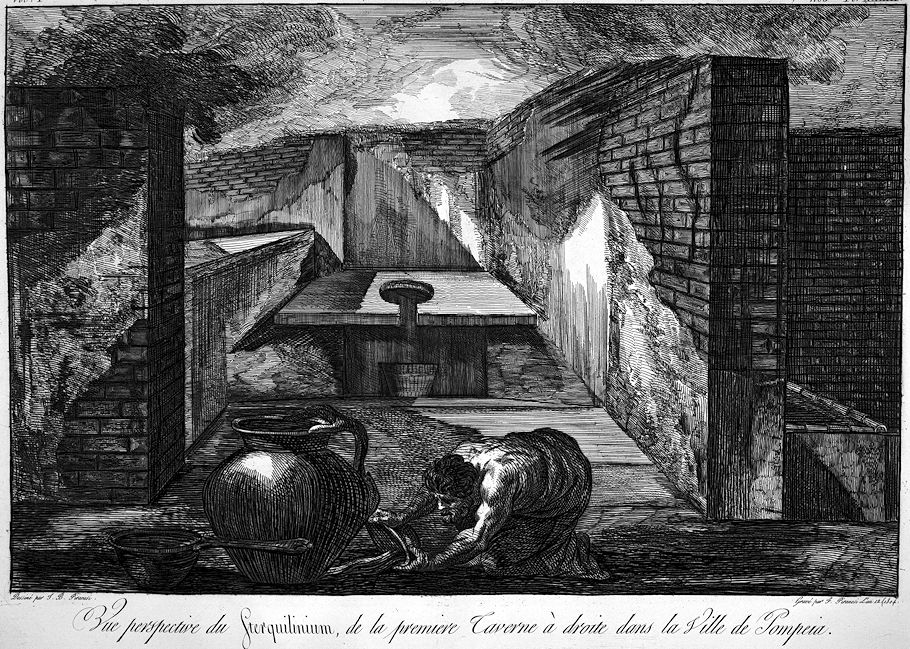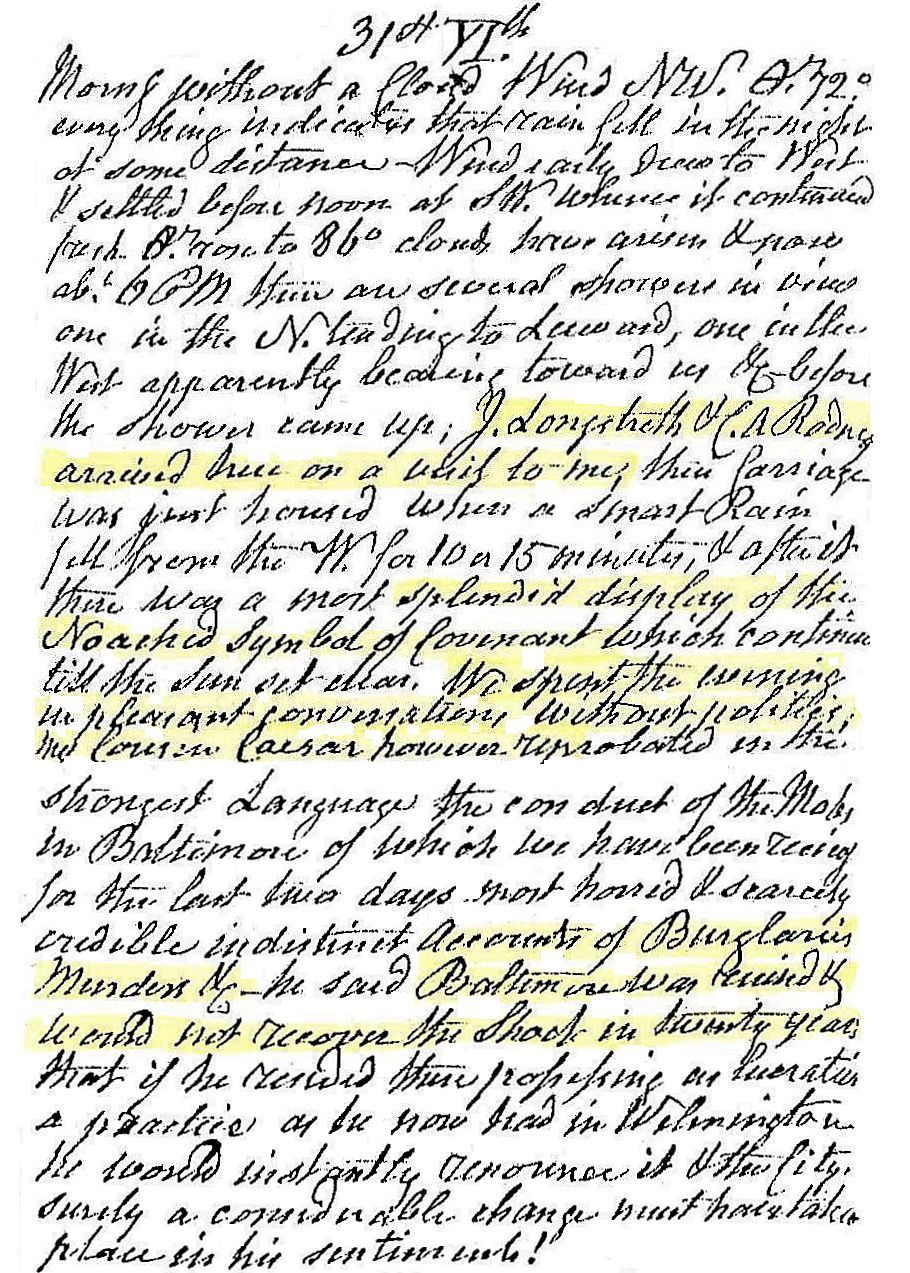31 July circa 385
Birth of Maria, daughter of Stilicho.
31 July 1778 Friday
. . . . . .
Artifacts of the Bianconi vs Piranesi 'Circus of Caracalla' affair 1772-1789

Illustration at the end of Carlo Fea's "Introduction" to Giovanni Lodovico Bianconi, Descrizione dei Circhi particolarmente di quello di Caracalla e dei Giucchi in essi celebrati.
46 y.o. Francesco Piranesi 1804
Le Antichitŕ della Magna Grecia Parte I

Perspective view of the Sterquilinium, from the first Tavern on the right in the City of Pompeii.
Drawn by G.B. Piranesi
Engraved by F. Piranesi Year 12 (1804)
31 July 1812 Friday

Morning without a cloud, wind NW, temperature 72°. Everything indicates that rain fell in the night at some distance. Wind early drew to west and settled before noon at SW whence it continued fresh. Temperature rose to 86°, clouds have arisen and now at 6 PM there are several showers in view, one in the N tending to leeward, one in the west apparently bearing toward us etc.--before the shower came up. J. Longstreth and C.A. Rodney[?] arrived here on a visit to me, their carriage was just housed when a smart rain fell from the W for 10 or 15 minutes and after it there was a most splendid display of the Noaehid Symbol of Covenant which continued till the sun set clear. We spent the evening in pleasant conversation, without politics; my cousin Caesar however reprobated in the strongest language the conduct of the mobs in Baltimore of which we have been reading for the last two days--most horrid and scarcely credible accounts of burglaries, murders, etc.--he said Baltimore was ruined and would not recover the shock in twenty years; that if he re....ed, then possessing as lucrative a practice as he now had in Wilmington he would instantly renounce it and the city. Surely a considerable change must have taken place in his sentiments.
31 July 2002
laws [of silence] "made"
This week 1676 years ago Rome witnessed the funeral of Helena Augusta. Constantine was in Rome to finish the celebration of his 20th jubilee as Roman emperor on 25 July 326, and Helena was late in arriving from Palestine with a piece of the Cross. Reenactionary indications point to [25] July being the date of Helena's death (very possibly at Naples), and to [28 July] being the date of the funeral (a web search of mausoleo elena will show where Helena was buried). Constantine left Rome for the last time on 3 August 326--this is more or less precisely when Rome as capital of the Roman Empire ceased to be, and when Constantinople as capital of the Roman Empire began. And, it is at this time that the law of silence regarding Helena and her finding of the Cross at Golgotha was instituted and immediately enforced. Ambrose, Bishop of Milan during the reign of emperor Theodosius, officially broke the silence on 25 February 395 during his obituary of Theodosius at Milan.
All this may not seem important, but this is first time in modern history for the exact date of Helena's death to be established, thus rendering a rewriting of Constantinian history necessary. Ironically, it was Eusebius, the first biographer of Constantine (c. 337) that cleverly recorded the events of Constantine's Vicennalia year in sequence, but modern historiography was led astray because it did not consider the possibility of a law of silence, even though modern historians do nothing but argue over Eusebius' silence.
Unlike damnatio memoriae, which really only more deeply establishes memories via the scars of erasure, the uncanny genius of laws of silence is that the more successful they are, the less history will ever know about them.
[In 2004, more severe reenactionary implications led to Helena's death having had occurred 25 July 326.]
31 July 2006
 
The Odds of Atlantic City 090
 
The Odds of Atlantic City 099
 
The Odds of Atlantic City 102
 
The Odds of Atlantic City 103
31 July 2007
Italian movie director Michelangelo Antonioni has died
The last time I saw The Passenger was right after watching Last Tango in Paris (at a five hour Maria Schneider film festival back in the late 70s). It was like she walked out of one big fuck-up and then walked right into another big fuck-up. Hilarious, even without any punchlines.
Italian movie director Michelangelo Antonioni has died
Hard to believe it's now 41 years ago. It was fun being a kid in the 60s, like I'm pretty sure my 4th grade teacher, Miss Kügler, read the fashion magazines (at least she got the hair-dos and the mini-skirt down pat). And seeing her amongst the nuns was a bit of modern cinema itself.
Necessary architecture books
Not just reading other things, how about writing other things too? Architectural literature could be so much more creative.
Necessary architecture books
Yes, you're right, reading and writing go hand in hand, and that's what's very creative about writing within cyberspace, the integral-ness of reading and writing.
There's so much to read now and there are so many ways to write/publish now, and I've become very fond of the places where you can actually do both.
As to books, I had and still have many, and at this point I'm seriously thinking of taking a lot of them apart and then mixing and rearranging all the various pages into a series of new books. Maybe I'm foolish, but I anyhow imagine there's a great untapped realm beyond the status quo.
31 July 2008
It rocked Eisenman on his chair...
"The servile crowd of the palace, who had so long adored the fortune of Stilicho, affected to insult his fall, and the most distant connection with the master general of the West, which had so lately been a title to wealth and honours, was studiously denied and rigorously punished. His family, united by a triple alliance with the family of Theodosius, might envy the condition of the meanest peasant. The flight of his son Eucherius was intercepted, and the death of that innocent youth soon followed the divorce of Thermantia, who filled the place of her sister Maria, and who, like Maria, had remained a virgin in the Imperial bed. The friends of Stilicho, who had escaped the massacre of Pavia, were persecuted by the implacable revenge of Olympius, and the most exquisite cruelty was employed to extort the confession of a treasonable and sacrilegious conspiracy. They died in silence: their firmness justified the choice, and perhaps absolved the innocence, of their patron, and the despotic power which could take his life without a trial, and stigmatise his memory without a proof, has no jurisdiction over the impartial suffrage of posterity. The services of Stilicho are great and manifest; his crimes, as they are vaguely stated in the language of flattery and hatred, are obscure, at least, and improbable. About four months after his death an edict was published in the name of Honorius to restore the free communication of the two empires which had been so long interrupted by the public enemy. m The minister whose fame and fortune depended on the prosperity of the state was accused of betraying Italy to the Barbarians, whom he repeatedly vanquished at Pollentia, at Verona, and before the walls of Florence. His pretended design of placing the diadem on the head of his son Eucherius could not have been conducted without preparations or accomplices, and the ambitious father would not surely have left the future emperor, till the twentieth year of his age, in the humble station of tribune of the notaries. Even the religion of Stilicho was arraigned by the malice of his rival. The seasonable and almost miraculous deliverance was devoutly celebrated by the applause of the clergy, who asserted that the restoration of idols and the persecution of the church would have been the first measure of the reign of Eucherius. The son of Stilicho, however, was educated in the bosom of Christianity, which his father had uniformly professed and zealously supported. Serena had borrowed her magnificent necklace from the statue of Vesta and the Pagans execrated the memory of the sacrilegious minister, by whose order the Sybilline books, the oracles of Rome, had been committed to the flames. The pride and power of Stilicho constituted his real guilt. An honourable reluctance to shed the blood of his countrymen appears to have contributed to the success of his unworthy rival ; and it is the last humiliation of the character of Honorius that posterity has not condescended to reproach him with his base ingratitude to the guardian of his youth and the support of his empire."
31 July 2022

31 July 2023 Monday
. . . . . .
|